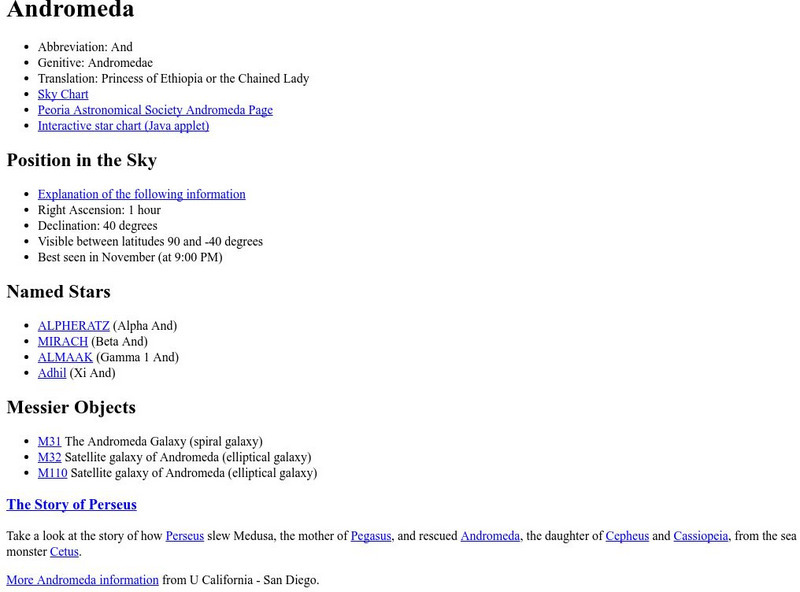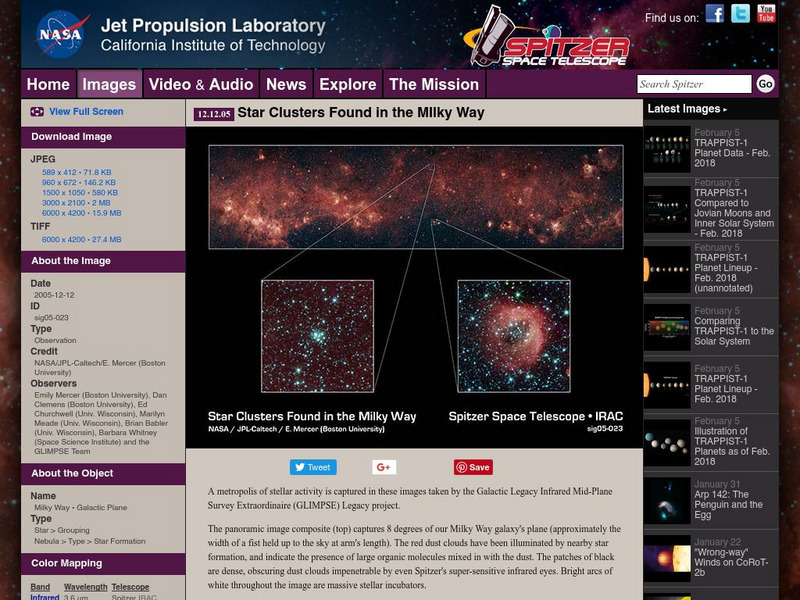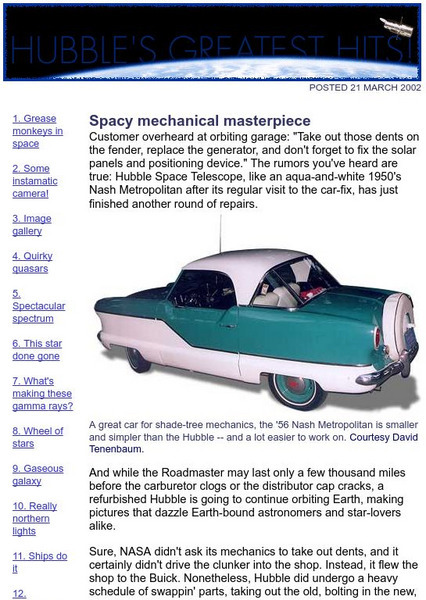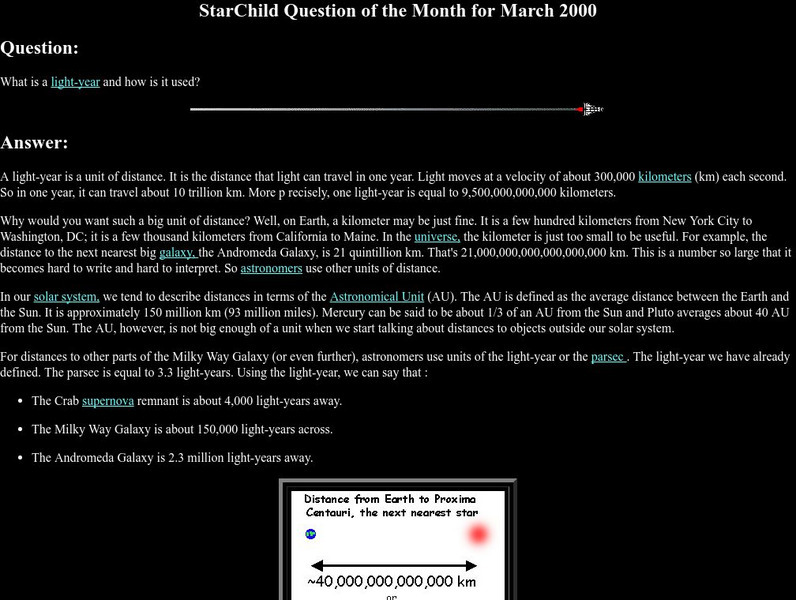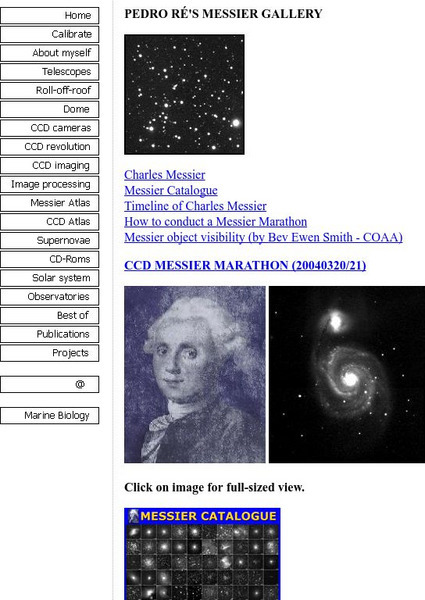Hi, what do you want to do?
NASA
Nasa Space Place: What Is a Light Year?
Brief description of light-years with examples and images.
University of Wisconsin
Constellations and Their Stars: Andromeda
This site has factual information about Andromeda. Also contains other links.
Space Telescope Science Institute
Amazing Space: Hubble's Wacky Window
Go behind the scenes of the Hubble and discover the different shapes and images it provides.
BBC
Bbc: Author Douglas Adams Dies
This obituary article reviews Adams' (1952-2001 CE) life and works.
California Institute of Technology
Spitzer Science Center: Star Clusters in the Milky Way
Under the heading, "Star Clusters Found in the Milky Way" this site examines specific details of an image displaying various clusters of stars in the Milky Way. The text below the image highlights in detail various features of the picture.
University of Wisconsin
The Why Files: Spacy Mechanical Masterpiece
An interesting article describing repairs which were completed on the Hubble telescope in 1993 and 1997. Also contains links to pictures taken by the telescope.
Enchanted Learning
Enchanted Learning: Zoom Astronomy
Where is our Solar System? How far away is the sun? What makes up the sun? Find out all you want to know about our solar system. This is a comprehensive on-line site about space and astronomy. Check out all of the excitement!
NASA
Nasa: Imagine the Universe: "Nasa Detects One of Closest"
Site provides the article, "NASA Detects One Of Closest And Brightest Gamma Ray Bursts." Provides links to learn more about gamma rays and black holes as well as other resources.
NASA
Nasa: Imagine the Universe: X Ray Binary Stars
Site provides a brief introduction to binary stars. Additional resources for students and teachers on this topic are offered as well as related topics.
Nine Planets
The Nine Planets: Sun Picture List
Various pictures and movies of the sun. Download some of these files and then give a presentation to your class explaining the solar phenomena.
NASA
Nasa Star Child: What Is a Light Year and How Is It Used?
This is a definition and example of how distance is measured in astronomy, such as the distance between our earth and the stars.
Ducksters
Ducksters: Astronomy for Kids: Black Holes
On this site, you can learn about mysterious powerful forces that absorb light called black holes. Study the science of black holes in outer space.
Other
Paper Plate Education: Serving the Universe on a Paper Plate
Excellent resource for "paper-plate" activities that help simplify various astronomy topics. Learn how to build a "Moon Finder" and "Planet Pointer," and create a paper-plate model that explains the Transit of Venus.
Curated OER
Sky Server: Scavenger Hunt
In this site, from the SkyServer of the Sloan Digital Sky Survey users hunt for stars, galaxies, quasars, asteroids and meteors. Learn what they look like and how to find them.
Curated OER
European Space Agency: Story of the Universe
The story of the universe is told in this engaging site by the European Space Agency. The history of European space science is timelined with dates ranging from 1066 to present day. The birth of galaxies, the big bang, and the beginnings...
Curated OER
Science Kids: Science Images: Universe Timeline
This diagram shows a universe timeline as suggested by many scientists and theoretical physics experts. This popular timeline of the universe has different stages which include: quantum fluctuations, inflation, dark ages, first stars,...
NASA
Viewing the Violent Universe: What Are Gamma Rays?
The universe produces a broad range of light, only a fraction of which is visible to our eyes. Gamma rays are nonvisible light, which also includes x-rays, ultraviolet light, infrared radiation, and radio waves.
Space Telescope Science Institute
Hubble Site: Edwin Hubble
At this site from HubbleSite provides information on how Edwin Hubble (1889?1953 CE) made some of the most important discoveries in modern astronomy. Learn about them as well as the invention of the Hubble Space Telescope. Open 'Who was...
Other
Pedro Re's Messier Gallery
Are you looking for information on Charles Messier? This site includes a detailed biography of his life along with a timeline, how to conduct a Messier Marathon, and photographs of the astronomical objects in Messier's catalog.
NASA
Nasa: Imagine the Universe: Welcome to the World of Multiwavelength Astronomy!
This Imagine the Universe site provides an introduction into the multiwavelength universe and astronomy. Site provides graphics, links to a quiz, facts on this topic as well as teacher resources.
Curated OER
Astro Lab: Space, a Contemporary Vision of the Universe
Explore how our contemporary understanding of the universe came to be. This overview looks at the history of three main areas of study, namely space, time, and the arrangement of matter.






